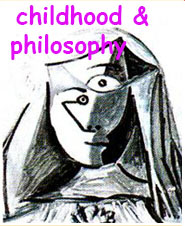the learning of “to be dead” as a methodological strategy in research with children
DOI:
https://doi.org/10.12957/childphilo.2018.36007Keywords:
metodologia, pesquisa com crianças, éticaAbstract
This article aims to present a methodology developed collectively within the discussions of the “Childhood and Contemporary Culture Research Group”, institutionally linked to the Postgraduate Program in Education of the State University of Rio de Janeiro and explored – in a particular way – in the context of a doctoral research field. In addition, it proposes to know about the experiences of displacement of children who move to a new residence. The expression “to be dead” in the title is based on Italo Calvino' s tale that brings forth, in Palomar’s reflection – a literary character whose life is marked by the singular way in which he sees the world –, the possibility of creating a perspective of seeing that implies perceiving a reality in which one's presence does not determine in a directive way the course of the experiences, although it implies a material change in the lived time and space. Thus, when he talks about learning to look at the world as someone who is dead, Palomar provokes us to think of ways of getting to know others which demand a not exempt observation and therefore does not disclaims responsibility from the researcher of the relationship that he establishes with his interlocutors. The following reflections come to compose our questions: When the child attracts our gaze in the quotidian of a time marked by acceleration, in which to look at others has become loss, be it of time, money or ethics that advocates considering others in the decisions we make individually? How does childhood show itself to us in the movement of life? What is it possible for it to tell us, even if the proposal is to postpone direct interlocution, lingering in the observation that, mediated by what affects us, it also provokes a dialogical movement?Downloads
Download data is not yet available.
Downloads
Published
2018-09-13
How to Cite
QUEIROZ, Caroline trapp de. the learning of “to be dead” as a methodological strategy in research with children. childhood & philosophy, Rio de Janeiro, v. 14, n. 31, p. 645–657, 2018. DOI: 10.12957/childphilo.2018.36007. Disponível em: https://www.e-publicacoes.uerj.br/childhood/article/view/36007. Acesso em: 10 may. 2025.
Issue
Section
dossier




